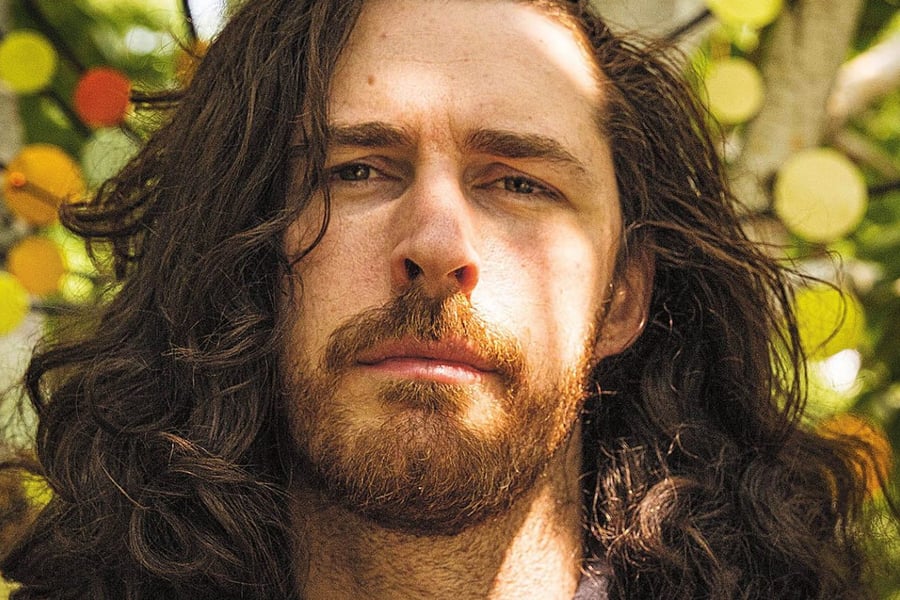In Dante Alighieri’s Inferno, the author describes Virgil and Dante’s grueling journey through hell and purgatory as they encounter horrifying creatures and weather revolting conditions. They develop an enduring sense of trust and care between one another throughout the poem. But when they reach heaven, Virgil is barred from entering with Dante. After all that, they must say goodbye. It’s a dissatisfying ending — one that the singer-songwriter (and Dante enthusiast) Hozier reimagines on the devotional epic “Hymn to Virgil.”
The choir-backed record considers an alternate conclusion in which Dante refuses to abandon Virgil at the gates, knowing all that they endured together. “I wouldn’t be seen walking through any door/Some place that you’re not welcome to/You stare at the faces smiling from somewhere warm/From somе place the sunlight won’t come through,” Hozier sings. Parts of the record are warped and distorted, sounding almost as though his voice is melting as he declares: “I would burn the world to bring some heat to you.”
“Hymn to Virgil” arrives on Unreal Unearth: Unending, the third iteration of Hozier’s most recent studio album. The record almost suffered a similar fate to that of Virgil in the poem he’s describing. Earlier this year, Hozier told Rolling Stone that he never planned to release the record — and more specifically, that he “didn’t think it was worth releasing.”
“Second-guessing creeps into you after a while,” he explained in a previously unreleased portion of the interview. “I was writing ‘Hymn to Virgil’ for a long, long time. It was one of the early, early songs that I was trying to approach in the [Unreal Unearth] sessions in 2020 back in Wicklow, trying to get that idea into a song.”
The song made it to us ahead of that conversation, but it was an accident, a communication breakdown that allowed it to sneak its way into a listening session for Unreal Unearth: Unaired. That version of the album attached the new songs “Nobody’s Soldier,” “July,” and “That You Are” featuring Bedouin. It followed the previous expansion Unreal Unearth: Unheard, which featured the chart-topping hit single “Too Sweet,” plus “Wildflower and Barley” with Allison Russell, “Empire Now,” and “Fare Well.” But “Hymn to Virgil” was perhaps the most striking among all the releases, the most ruinously affecting. And Hozier was content with letting it sit in a vault forever.
“By the time I’d finished ‘Hymn to Virgil,’ I just felt like maybe I’d carried it so long and walked such a winding path,” he explained. After producing and remixing an initial version of the song himself, he continued working on it with Jeff Gitty, then presented those sessions to Dan Tannenbaum, better known as Bekon. “There’s part of you that’s like, maybe I’m trying too hard with it,” Hozier added. “It doesn’t sound like that, but it’s an idea I held in my pockets for so long, and eventually, there’s one part of you that’s like, maybe I lost what the original idea was.”
Inferno is a prevailing influence across the Unreal Unearth universe. “That You Are,” for example, interprets the author’s infatuation with Beatrice, a muse he placed on an impossible pedestal of perfection. And “Francesca” is a direct reference to Francesca da Rimini, who was banished to the second circle of hell for giving into passion that was demonized as lust.
Love Music?
Get your daily dose of everything happening in Australian/New Zealand music and globally.
With “Hymn to Virgil,” Hozier worried that the specific references to the poem would be alienating to those who haven’t studied it as deeply. “I suppose part of me thought, well, maybe it’s too musical theater,” he said. “Is this a book report? Is this a musical about Dante’s Inferno? Could somebody relate to this?” He also worried the production might be “too contemporary” in sound. “It’s nearly that I’ve been around it for so long that the way my ears hear it now are very different from how other people’s ears will hear it,” he added. “That happens with songs sometimes. It’s not necessarily that I’m committed to this idea that it’s not good enough.”
But the root of the conflict Hozier reimagines on the record is profoundly current, despite being written 500 years ago. It’s recognizing that someone you care for deserves more than what they’re being given. It’s refusing to betray them in the face of that. “There’s points where Virgil picks Dante up and carries him over certain places, and puts him on the back of beasts who fly him over ravines and all of this fantastical stuff. He holds this guy when he faints and trembles and weeps,” Hozier said. “Dante the living human in this poem is, like, horrified. And then he arrives at the end of it, and Virgil says, ‘Well, I can go no further.’ And Dante, the writer, knows on some level that Virgil is not a man who deserves to be in hell.”
On the chorus of the record, Hozier cries out: “You are the reason I went through it/The only meaning as I knew it/And I can only do my best, I do not do this for myself/I’d walk through hell on living feet for you.” From his perspective, it was the only way to bring justice to the permanently intertwined experiences of Dante and Virgil.
“The only satisfying thing is to say, ‘No, I’m not going to leave your side after seeing what I’ve seen, and after you’ve been with me through all of this,’” Hozier said. “Because if you’re not welcome in that space, I have no interest in being anywhere near it.”



































